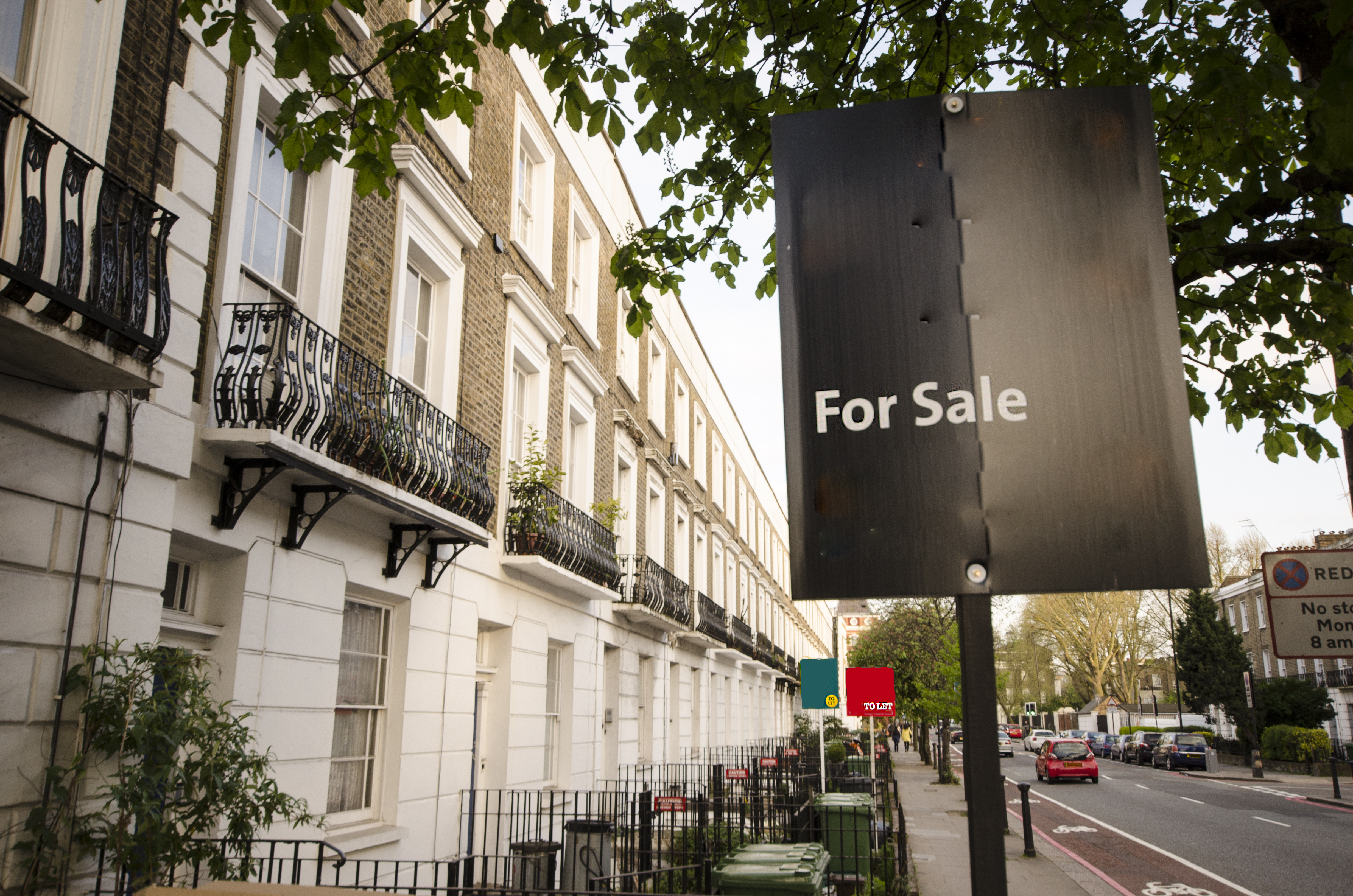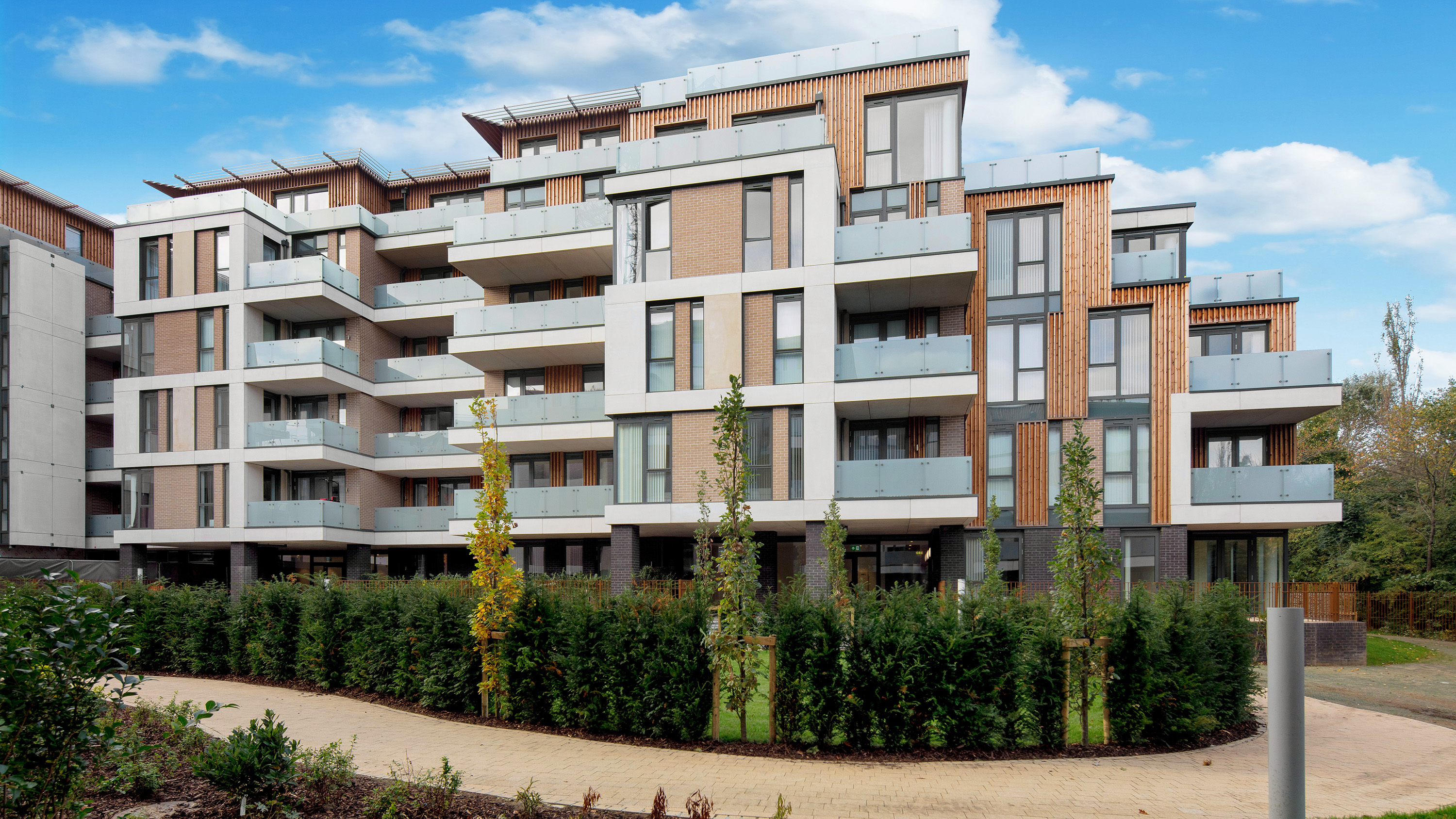How to buy a house or flat in 2022: a 10 step guide for first-time buyers
Find out how to buy a house and get a place of your very own. Our step-by-step guide has all you need


Get small space home decor ideas, celeb inspiration, DIY tips and more, straight to your inbox!
You are now subscribed
Your newsletter sign-up was successful
If you’re ready to become a property owner for the first time, it’s essential to be in the know about how to buy a house or flat right from the start. You’ll need to get your finances lined up, arrange the professional help that’s required, and understand the process that will take you from the decision to become a home owner to holding the keys to your very own pad in your hand for the first time.
Sounds a bit daunting? Don’t worry, we’re right here. Our guide will ensure you understand each step of the house-buying journey, and what you need to do when to ensure the house or flat you fall for becomes yours. We’ll make sure you’re savvy about costs, too, and our comparison tool will ensure you can find the best mortgage rates.
- Want to know how much the home of your dreams will cost? Check out our summary of house prices and predictions for 2022
1. Get a mortgage for your house purchase
When you’re taking out a mortgage to buy a house, be aware that you need to begin the process before you start house-hunting. This way, you’ll know how much you can borrow so you’re not wasting time on flats and houses on which you wouldn’t be able to afford the monthly repayments.
You may have been able to save money towards a deposit, which will mean a larger choice of mortgage deals, and contribute to the total available. Speak to a whole market mortgage broker, such as Habito, who will give you unbiased advice; help you find the best deal; answer any questions; and negotiate the best deal based on your financial history and current status. Use the online comparison tool below.
Use our guide to getting a mortgage for first time buyers and obtain the agreement in principle for the mortgage that demonstrates you are a serious buyer when you come to make an offer.

L&Q Group, developers of Quebec Quarter in London, offer a shared ownership scheme on their apartments
2. Investigate home ownership schemes
There are government schemes designed to help you buy a home.
Help to Buy ISAs closed to new accounts on 30 November 2019. However, if you already have one of these, you can carry on saving into your account until November 2029. Check the Help to Buy ISA details.
Get small space home decor ideas, celeb inspiration, DIY tips and more, straight to your inbox!
Lifetime ISAs are available, however, and you can open one of these to save for your first home. They are available if you’re 18 or over but under 40. You can put up to £4,000 each year into a Lifetime ISA until the age of 50. The government will add a 25 per cent bonus to your savings, up to a maximum of £1,000 per year.
Once you’re ready to buy your first home, you can withdraw money from a Lifetime ISA to help you fund the purchase as long as: the property costs £450,000 or less; you buy the house or flat at least 12 months after you opened the Lifetime ISA; you use a conveyancer or solicitor to act for you; and you’re buying with a mortgage.
Buying with someone else who has a Lifetime ISA? They can use their savings, too.
Note that if you have a Help to Buy ISA as well as a Lifetime ISA, you can only use the government bonus from one to help buy your first home.
Help to Buy equity loan 2013-2021 applications closed on 15 December 2020, and the scheme itself closes on 31 March 2021. If you’re using one of these, you have until 31 March 2021 to legally complete your purchase and get the keys to your home.
Help to Buy equity loan 2021-2023 applications opened on 16 December 2020. The scheme is for homebuyers in England while Wales and Scotland have separate schemes.
These loans can be used towards the cost of a new-build home, and those eligible can borrow a minimum of 5 per cent and up to 20 per cent (or 40 per cent in London) of the full purchase price of a new-build home. You have to buy your home from a homebuilder which is registered for Help to Buy: Equity Loan.
Interest isn’t charged for the first five years of the loan term, but from year six, you will begin to pay it. You must have a repayment mortgage if you want to take out an equity loan, and this must be valid for the duration of the loan.
The amount you can spend on the home you’re buying in this scheme depends on the area of England in which it is located.
When it comes to repaying the loan, the amount you repay is linked to the value of your home at the time of repayment, and not the amount originally borrowed.
To be eligible for this equity loan scheme, you and anyone you’re buying with must not own a home or residential land, or have done so in the past, in the UK or abroad, and not have any form of sharia mortgage finance.
A Help to Buy agent can help you apply.
Read our guide on Help to Buy for more details.
Shared ownership allows first-time buyers to buy a share of between 25 and 75 per cent of a home and pay rent on the rest through a housing association in England. Scotland and Northern Ireland have different rules, and you need to contact your local authority if you’re in Wales.
Your household needs to be earning £80,000 per year or less (or £90,000 a year or less in London). Check out the government’s information and find a home to buy through the shared ownership scheme via the Help to Buy agent in the area in which you want to live.
- Find out more about shared ownership in our comprehensive guide.

3. Get in the know about leasehold and freehold
It’s important to understand the difference between leasehold and freehold when you’re buying a property.
If you buy a leasehold property, you own the building but not the land. With a freehold property, you own both building and land. Most frequently, in England and Wales, buying a flat means buying a leasehold, while houses are freehold – but there is a trend for new-build houses to be sold as leasehold properties.
Why does it matter whether you own the land? Buy a leasehold property and you will probably have to pay an annual fee called a ground rent to the freeholder (also called the landlord). You will usually also have to pay service charges. You may also be called on to contribute to major works on the building although the landlord will have to consult you if this will cost each leaseholder more than £250.
If you are interested in a leasehold property, find out how long is left on the lease, which has a fixed term. A lease can last for up to 999 years or periods such as 125 years, but they can be short. A mortgage lender will probably require 80 years of the lease remaining when you buy. Be aware, too, that the property’s value will fall and it can be hard to sell when there are fewer than around 90 to 80 years left on the lease.
The other factors to consider if you’re buying leasehold are that you may not be able to own a pet or sub-let, or you may be able to only with permission. You’ll also have to get the OK from the freeholder for some (usually structural) alterations to your home.
Freehold properties allow you to own both building and land until you choose to sell. You won’t be paying ground rent or service charges. You’ll be the one looking after the building, so you can get your own quotations for work when it’s needed. Equally, you won’t have the concerns that some leaseholders have that the building is not being sufficiently maintained as this is up to you.
New-build houses are increasingly being sold as leasehold properties. This brings the same cost issues with as a leasehold flat including ground rent, fees for permission for changes and service charges.
Recent media reports have revealed ground rent charges that increase steeply over time and large fees being demanded for minor alterations to a house. Owners have also found that when they try to exercise the right to buy the freehold, it has been sold on by the developer, and the process is both difficult and extremely expensive. These issues can also cause major problems if an owner wants to sell.
Always check whether a new-build home is freehold or leasehold, and appoint an independent solicitor and ask them to confirm what you’ve been told.
4. Search for a home
The major portals Rightmove, Zoopla and Onthemarket will show you what’s out there, but it’s worth taking the old-fashioned approach and talking to the agents who cover the area in which you’re looking to buy a house as they’ll be able to let you know about properties they are about to list. Here are the rules to follow when you’re looking:
Do know the price bracket you’re looking in following your discussions with mortgage lenders, but don’t dismiss properties that are under your maximum in case there’s competition from other buyers. Equally, you can look above in case a seller is desperate to move and open to an offer. However, beware of wasting time with properties that are always going to be out of your reach.
Do draw up a list of must-have features, but don’t be too rigid. Some will be non-negotiable – for example the maximum distance of a commute – but be open to different possibilities and the fact that over time you may be able to improve both exterior and interior.
Do check out the local area online with Street View, which can save you a journey to a home in a location that’s definitely out of the question.
Don’t spend your life looking online. Until you actually arrange viewings you won’t get a true feel for what you can buy.
Do check out our guide to viewing properties to make sure you're looking for the right things.
5. Arrange a solicitor or conveyancer
It’s worth finding the professional you’re going to work with before you make an offer as you’ll be asked for these details when you do. Your chosen professional will also give you the lowdown on how to buy a house.
Both solicitors and conveyancers can undertake the legal work involved in your house purchase – such as drawing up contracts, providing advice and recommendations, and dealing with the money side of the purchase.
Personal recommendation is always valuable, and appointing someone in the local area can be a good idea. Don’t just choose on price – a dedicated professional with time to spend on your conveyancing is vital. Your estate agent is also likely to recommend one, but make sure that the conveyancer is certified by the Solicitors Regulatory Authority or Council for Licensed Conveyancers or the Law Society.
Conveyancing can take time, and there’s a lot of paperwork and back and forth, but be patient: this process ensures that everything is legally in your best interest as a home buyer. It can be easy for a first-time buyer to want to speed up the process as much as possible, without checking that you are getting the best possible deal at every step of the buying process, but a good conveyancer should be able to spot anything that might need amendments.*
*Tip provided by Jacqui Harley at JMP Solicitors
6. Make an offer
Once you’ve decided you want to purchase the property, you can put in an offer.
Bear in mind how long it’s been on the market – a buyer may be more open to offers if the home has been up for sale for a while. Pay attention to similar properties in the area as well, and how long they’re taking to sell.
You can check out the price history of the property using Rightmove and Zoopla. Take a look, too, at local prices per square foot on the latter, which can help guide you.
Find information on sold prices in the area via the Land Registry’s UK house price index.
Online estimates can be a guide, but don’t rely on them – instead think of them as ranges of value because they can under or over price by some margin.
Don’t be surprised if a low offer is rejected at once. It is most likely to be successful if the property has been on the market for a while, or if the seller needs to move quickly. An offer of 5 or 10 per cent lower than the asking price can be a good place to start.
Be prepared to negotiate if a first offer is rejected. As a first-time buyer you are in a strong position without a chain behind you, which can help. Flexibility over completion date to suit the seller may also assist your bid.
Once the offer has been accepted ask that the property is taken off the market. If this is refused, be very wary of spending out on a survey and conveyancing as another buyer could come along and offer more, so-called gazumping. In England and Wales an accepted offer is not legally binding until exchange of contracts.
To avoid getting gazumped, ask the estate agent (firmly and repeatedly) to take the property off the market and change the sign outside to 'sold.' Gazumping is deemed unethical by some agents but it is not illegal.
7. Consider buying appliances
When you buy a house or flat the seller should generally leave integrated appliances in place, but be aware that this isn’t the case for freestanding appliances. It may be that the seller is happy to include them in the sale, of course. Alternatively, they might be willing to offer them to you, but at an additional cost.
Having all the appliances in place already in your new home can certainly make things easier when you move in so you’re not left without, say, a fridge, until you can get a delivery organised. But do bear in mind that if the appliances look old they could be more trouble than they’re worth, and you’ll be stuck with the job of having them removed ready to fit new ones. Whether you agree to part with the cost the seller suggests – through their solicitor – to buy them is up to you.
If you do decide to buy any appliances, request that your solicitor asks the seller’s solicitor to confirm that they are in working order.
How will you know exactly what’s included when you buy a house or flat? You’ll be able to scrutinise the details as part of the documentation your solicitor will provide (see below).
8. See the house buying process through
Your solicitor or conveyancer will now act as an intermediary between you and the seller via his or her legal professional. A good estate agent will also liaise with both you and the seller to ensure the house purcahse moving forward.
The conveyancer examines the draft contract, raises enquiries with the seller’s solicitor, and does the legal searches.
You will need to apply for the mortgage and have the property valued meeting the lender’s criteria. You will also need to decide on the type of survey you wish to have.
Keep in regular contact with your conveyancer to ensure things are moving forward.

9. Exchange contracts on a house purchase
Once you’ve got the surveyor’s report, have a mortgage offer, and all the searches and enquiries have been received and everything is satisfactory, you can exchange contracts with the seller. Your deposit needs to be with the solicitor in time for exchange.
A date and time will be arranged for exchange of contracts. At exchange the deal becomes legally binding and if you pulled out of the purchase, you would lose the deposit. The seller is also legally committed and cannot sell to someone else.
Make sure you have insurance in place from this point.
10. Complete your house purchase
The date of house purchase completion will have been agreed between you and the seller before exchange. It’s frequently two to four weeks after exchange.
You will be given the keys once the seller’s solicitor has confirmed they’ve received the money due.
After completion, your conveyancer will also pay the stamp duty, and send documents to the Land Registry on your behalf.
Can you still buy a house or flat during the coronavirus?
You can look for properties to buy, view them, and move home in England despite the current restrictions, although you should always check the government’s official guidance for the latest information.
If you are able, conduct a virtual viewing first. This could help you rule out unsuitable properties without even making a trip away from home. If you are potentially serious about a property, remember that if any member of either the household being viewed or the household undertaking a viewing is showing symptoms of COVID-19 or is self-isolating, then an in-person viewing should be delayed.
When you’re attending a viewing, maintain as much distance as possible from people who are not members of your household – two metres if you can – wash your hands frequently, and avoid touching surfaces as much as possible. Wear a face covering.
Sellers should have opened internal doors before the viewing, and cleaned surfaces such as door handles in any case. If they are following recommendations, they should also be out of the property during the viewing to avoid unnecessary contact.
In Wales, virtual viewings are strongly encouraged although viewings can take place following the guidance. Check the latest advice on moving home in Wales. You can also attend viewings in Scotland. Consult the Scottish government guidance.
Can you buy a house with no money down?
The coronavirus pandemic has made getting a mortgage more difficult than it was before. You’re likely to need a deposit of at least 10 per cent to get one, and more to get the better mortgage deals. That’s because a bigger deposit gets you a lower interest rate and therefore cheaper monthly repayments.
If you’re struggling, check out the home ownership schemes above, which could help you save enough for the deposit you’ll need, or give you a foot up on the property ladder via a shared ownership scheme.
What do you need to qualify for buying a house?
Credit checks are part of the process when lenders are deciding whether or not to offer you a mortgage. A good credit score is important, and if yours isn’t, you’re likely to be turned down.
Need to check your score? You can get copies of your file from Equifax, Experian and TransUnion. Make sure there are no mistakes – you can ask the lender to correct an error, if necessary.
If your score is poor, take the time to improve it before you set out on your home-buying journey. You can adopt strategies such as making sure you don’t pay bills late or miss payments, and avoiding other applications for credit until you’ve sorted out the mortgage. Find out more about what you can do in our mortgages with bad credit in-depth guide.
How do you buy a house with sealed bids?
If there's hot competition for a property, you may be asked to submit a bid in a sealed envelope. It isn't legally binding but could secure you the house.
How much to write down? Don't be tempted to over-pay: you may bag the property but the mortgage lender could decide the property is worth less – or you might have to sell on in future at a loss. Instead, submit a figure that you think is fair, but avoid a round number. So, if you think it's worth £250,000, submit a bid for £251,000.
Compare mortgages
Use the online comparison tool developed by mortgage experts Habito and see how much you could borrow.
More on house buying

Sarah is a freelance journalist and editor writing for websites, national newspapers, and magazines. She’s spent most of her journalistic career specialising in homes – long enough to see fridges become smart, decorating fashions embrace both minimalism and maximalism, and interiors that blur the indoor/outdoor link become a must-have. She loves testing the latest home appliances, revealing the trends in furnishings and fittings for every room, and investigating the benefits, costs and practicalities of home improvement. It's no big surprise that she likes to put what she writes about into practice, and is a serial house revamper. For Realhomes.com, Sarah reviews coffee machines and vacuum cleaners, taking them through their paces at home to give us an honest, real life review and comparison of every model.